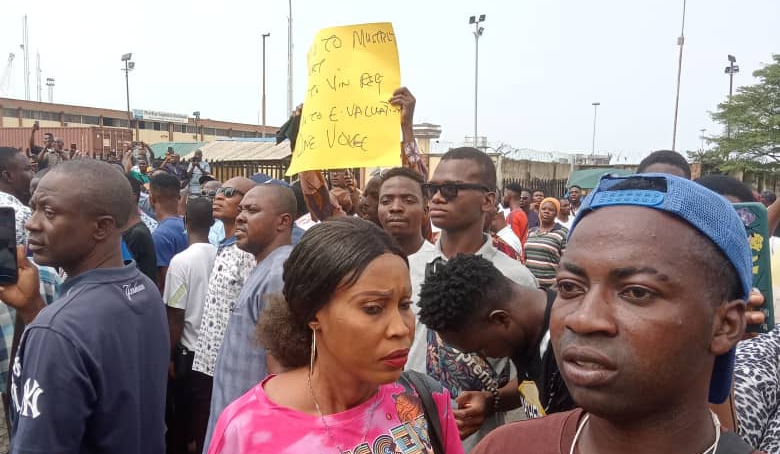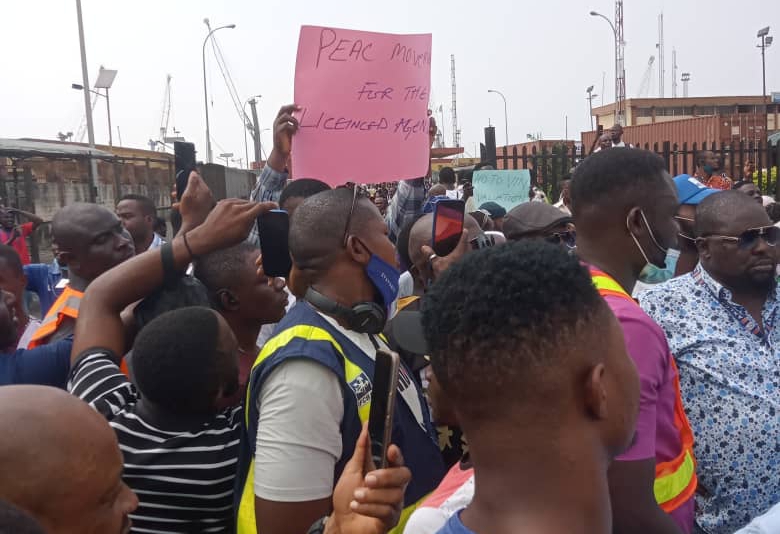STRIKE DAY 2: Freight Forwarders Move Protest To LPC , As Operational Activities Grounded At PTML, TCIPC
There are indications that commercial activities will be crippled at the Lagos Ports Complex (LPC) Apapa on Tuesday as freight forwarders and licensed customs agents are set to extend the protest to other seaports over the newly introduced Vehicle Identification Number (VIN) Valuation System policy of the Nigeria Customs Service.
Port operations was halted on Monday as freight agents sealed off the popular Car Park C at Tin Can Island Port and PTML terminals over the controversial VIN policy , even as they vowed to extend the peaceful protest to Kirikiri Lighter Terminals (KLT) and the Zonal Headquarters of Customs at Harvey Road Yana Lagos.
This is coming barely the expiration of the 72-hours strike notice issued by the joint registered freight forwarding associations operating at the PTML Terminal in Lagos last week over the policy.
Multiple sources told our correspondent that the protest will continue on Tuesday at LPC Apapa in furtherance to shutdown cargo clearance and as part of solidarity support to drive home their demands for government intervention on the VIN policy.
APFFLON Chairman, PTML Chapter, Comrade Jude Darrick Ige told our correspondent that the protest will continue on Tuesday and Freight agents will converge at PTML at 11am before proceeding to LPC as part of the solidarity movement.
Ige stressed that plans are ongoing to also cripple operational activities at Kirikiri Lighter Terminals (KLT) on Wednesday adding that the associations have agreed to shutdown port operations.
According to him, the peaceful protest will be systematic in approach adding that the protest may likely extend to Harvey Road Yaba Lagos.
Remilekun Sikiru a customs broker representing the youths in freight forwarding practice at Tin Can Island Port, lamented that the protest will continue until government listens to the voice of the common man.

- Advertisement -
Asked about what informed that protest he said “We are actually protesting against the inappropriate and unacceptable jerk up amount the customs impose on all the vehicles imported into the country’
But the National Public Relations Officer, Nigeria Customs Service while reacting on the protest by agents ion VIN valuation in a statement on Monday, said “In recent times the concensus among clearing agents on the valuation of used vehicles appear to favour a harmonized value system that is consistent across all Customs platforms in Nigeria.
“They insisted that the same make, and model of cars should be made to pay the same amount of duty. These agents also demanded the discontinuation of the discounted value method which allowed for the subjective considerations of officers in the Customs Valuation Unit who rely mainly on the book value of vehicles discounted at a fixed rate over time.
They demand standardisation but prefer randomized values. They demand simplification of trade processes but prefer a little complication here and there.
” For this lot the contradictions in their demands makes sense so long as it translates to the payment of the least tax to government. Their propensity to give advice but not to take it smacks of hypocrisy and should be called out by well meaning Nigerians. ”
According to him, before the introduction of VIN policy a town hall meeting was held across the country about the benefits adding that the service was confident that the innovation in its clearing process will satisfy the desires of agents clamouring for change
“Before the introduction of this tool, town hall meetings were held across the country stating its benefits, one of the greatest being trade facilitation. Following the demands of agents for a simplified system which recognises standard values, NCS was confident that this innovation in its clearing process will satisfy the desires of agents clamouring for change.

“The resistance to VIN-Valuation therefore comes as a surprise seeing that it was deliberately designed to meet their demands. It also compels us to investigate further the intentions of those protesting its use. When our Valuation officers gave out ex-factory prices for duty assessment they were accused of collecting monetary inducements to give lower values.” Bomadi explained .
By Roland Ekama




Comments are closed.